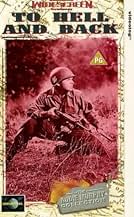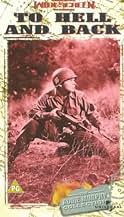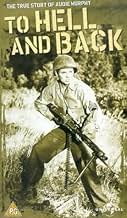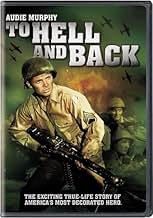CALIFICACIÓN DE IMDb
7.1/10
6.3 k
TU CALIFICACIÓN
La verdadera historia de la II GM de Audie Murphy, el soldado más condecorado de la historia de EE. UU. Basada en la autobiografía de Audie Murphy, que hace el papel de sí mismo en la pelícu... Leer todoLa verdadera historia de la II GM de Audie Murphy, el soldado más condecorado de la historia de EE. UU. Basada en la autobiografía de Audie Murphy, que hace el papel de sí mismo en la película.La verdadera historia de la II GM de Audie Murphy, el soldado más condecorado de la historia de EE. UU. Basada en la autobiografía de Audie Murphy, que hace el papel de sí mismo en la película.
- Premios
- 1 nominación en total
- Dirección
- Guionistas
- Todo el elenco y el equipo
- Producción, taquilla y más en IMDbPro
Opiniones destacadas
10valf
To Hell And Back rates as one of the truly classic and unique movies of our time. To have Audie Murphy himself have to remember and "relive" his war experiences, having been removed from them for only ten years, is unprecedented.The movie is the forerunner of such movies as We Were Soldiers Once...and Black Hawk Down. Although Col. Tom Moore was only an on scene adviser he also relived some of the scenes(his own admission) that were depicted in "..Soldiers..." Black Hawk Down depicted actual footage of the battle. The historical and personal accuracy of these movies is tremendous. Audie, however paid a bitter price. His war experiences tormented him the rest of his life with constant insomnia, depression and anxiety. I was lucky enough to meet him at Suffolk Downs Race Track in 1959 or 1960. I always wondered what became of his siblings and sister. Audie Murphy is a true hero of the twentieth century. Everyone should take note of what true character, integrity and loyalty Audie gave us. Thank you Audie.
Let's face it; in a world of computers and egotists so far absent of true human contact and chivalry, Audie Murphy will forever shine brightly and ever brighter as a true man. He is perhaps the last real genuine American hero, as we slip into a vortex world of lawyers, statistics, and scams.
1.) At the age of 12, he chose to be a man by taking over his absentee father's role in his family; he literally fed his dirt poor family by putting meat on the table with a keen eye and a broken down .22 rifle. Working two jobs at this age, he still wrote cursively w/ excellent spelling and diction when he had to quit his education. This is something half of the high schoolers of today can't do as they "rap" themselves in hedonistic pursuits of clothes, breeding without responsibility, drugs, cell phones, and a disregard for another person's respect and rights.
2.) After multiple attempts to join our country's armed forces, he became the most highly decorated soldier in our nation's history, with countless feats of heroism (please see WWW.AUDIEMURPHY.COM.).
3.) He achieved Hollywood star status with his tough yet tender persona.
In a current world of 50 cents, we can look back to a time when a man was truly a man, and that man was the United States Medal of Honor Winner: AUDIE MURPHY.
1.) At the age of 12, he chose to be a man by taking over his absentee father's role in his family; he literally fed his dirt poor family by putting meat on the table with a keen eye and a broken down .22 rifle. Working two jobs at this age, he still wrote cursively w/ excellent spelling and diction when he had to quit his education. This is something half of the high schoolers of today can't do as they "rap" themselves in hedonistic pursuits of clothes, breeding without responsibility, drugs, cell phones, and a disregard for another person's respect and rights.
2.) After multiple attempts to join our country's armed forces, he became the most highly decorated soldier in our nation's history, with countless feats of heroism (please see WWW.AUDIEMURPHY.COM.).
3.) He achieved Hollywood star status with his tough yet tender persona.
In a current world of 50 cents, we can look back to a time when a man was truly a man, and that man was the United States Medal of Honor Winner: AUDIE MURPHY.
I've always Liked watching Audie Murphy's movies since I was a child. I guess it also had to do with the fact that he had that baby face. Being a combat wounded Viet Nam vet, I can relate to his ordeal during and after the war. This man was a caring man who thought of others. Like many other "Medal of Honor" winners; he like the others are not the movie RAMBO hero. They Are "THE REAL McCOYS" It's ironic, though. His last movie in 1971 was called "A time for dying"[A Jesse James movie.] In that same year he died in a small plane crash. A friend of his had once said," all those Germans could not kill him,yet a plane crash near home took his life." My last words are, "May he be with the Lord."
A largely ordinary film about an extraordinary man, To Hell And Back was made a decade after combat soldier Murphy left the service, a natural enough choice of subject matter. Based upon Murphy's book of reminiscences of the same name, the film was viewed as a useful tonic for recruitment after the Korean War by the Army and they co-operated enthusiastically with the studio's production.
After a briefly covering the actor's childhood, the rest of the movie focuses on Murphy's striking military career. With little effort to probe the psychology of its central character, it ends before his discharge. Director Jesse Hibbs does a competent piece of work but Murphy's uniqueness deserved better - someone like Aldrich, Siegel or Samuel Fuller, who around the same time was producing such work as The Steel Helmet and Fixed Bayonet! The cigar-chomping ex-infantryman brought to war projects an essential grit - as well as directorial flair - that's too often missing from To Hell And Back.
Hibbs' version of World War II, made conservatively and with the army looking over his shoulder, lacks the cynicism and bitter truths one can find elsewhere. Indeed a good deal of To Hell And Back, especially during the early parts, is relatively light-hearted. Turned down by the Marines and paratroopers for being underweight in real life, there's a suggestion at the start that Murphy was a little sickly - a poor start for a hero. Hence we see him suffering from sea-sickness on his way to his first combat zone, and then suffering a reaction from his inoculations which, we are told, has laid him up in bed for a week. So much so that his superiors consider sending away from the front line (a fact ruefully recalled later).
What's striking today about To Hell And Back is how ironic it is. Just as 'Murphy' the soldier initially seems an unlikely superhero, so Murphy the actor might be the last person you'd cast as himself (perhaps anticipating this, the star allegedly suggested Tony Curtis for the lead). Unlike the brawling, macho hero figures familiar to cinema audiences, Murphy is boyish and slight looking - young enough, even in 1955, to play himself as a youth. An unassuming if determined character, 'Murphy' is somewhat ill at ease with women (a trait, incidentally, not reflecting real life), one reason why perhaps the 'Italian interlude' of To Hell And Back, when the soldiers are on leave, is the least convincing of the narrative. He's an introspective, diffident character hardly marked out as a leader of men. And yet this is the man who, amongst other acts of extreme valour, stood up on a burning tank with a machine gun to keep the German advance at bay and destroyed several machine gun nests on his own. The man of whom the 3rd Infantry Commander in World War II called "the greatest combat soldier I have ever known" and another Major-General dubbed "beyond a doubt the finest soldier I have ever seen." There's interesting power occasionally in the film too, exactly because the actor's mild, everyman quality disavows those extreme qualities laying hidden below the baby-faced surface, even while the star's real life history affirms them. When Murphy weeps at the death of a newly fallen comrade, although it's just a short scene, the grief seems true and universal; in its modest way a testament to the courage and loss of all fighting men, and not just typical Hollywood emotional artifice. John Ford's work, to take one example, includes moving graveside scenes, but with the likes of poetically manufactured heroes Fonda and Wayne. None have such a unique impact as this.
Such a moment of introspection is unusual in To Hell And Back. Ending as it does with Murphy's war drawing to a close and a parade, understandably the film offers no portrait of the star's later years, decades when he faced stress-related nightmares, health issues, an amount of painkiller dependency and other personal issues. Interestingly at one point the star did consider a sequel to the film, tentatively entitled 'The Way Back', even going so far as reportedly writing a script in 1956, but this idea fell by the wayside.
Murphy, who never considered himself more than a competent actor, wears the mantle of great courage very lightly in his film, just as he did in real life (attempting to give his medals away to relatives for instance). One reason for this is perhaps the star's feelings towards the material. Although To Hell And Back was, unsurprisingly, his most successful film career-wise he admitted to a slackening of interest in events. After all, he'd already done them first hand and then revisited them during the writing of his book, so much so that he "got tired of reliving all these experiences." Murphy saw the purpose of the film as utilitarian as much as entertaining, showing newer infantry what it was really like just as much as pleasing the public. Perhaps the greatest irony of all is that the American military has apparently always preferred Wayne's much more dynamic Sands Of Iwo Jima over this film as classic entertainment for serving ranks.
Murphy won 33 military awards, including every medal of valour America gives, as well as the Legion de Honour and Belgian Croix de Guerre. By contrast his film, although financially successful, received far fewer accolades. Recently reissued in all its widescreen, colour glory and in a good print (if lacking any documentary support) it's still worth a look. For a less compromising view of war on foot, then the aforementioned Fuller is one place to start; for war's doomed romance you'd want to see Sirk's A Time To Live And A Time To Die. But To Hell And Back, with all flaws, is a sobering reminder of what a mighty real hero looks like.
After a briefly covering the actor's childhood, the rest of the movie focuses on Murphy's striking military career. With little effort to probe the psychology of its central character, it ends before his discharge. Director Jesse Hibbs does a competent piece of work but Murphy's uniqueness deserved better - someone like Aldrich, Siegel or Samuel Fuller, who around the same time was producing such work as The Steel Helmet and Fixed Bayonet! The cigar-chomping ex-infantryman brought to war projects an essential grit - as well as directorial flair - that's too often missing from To Hell And Back.
Hibbs' version of World War II, made conservatively and with the army looking over his shoulder, lacks the cynicism and bitter truths one can find elsewhere. Indeed a good deal of To Hell And Back, especially during the early parts, is relatively light-hearted. Turned down by the Marines and paratroopers for being underweight in real life, there's a suggestion at the start that Murphy was a little sickly - a poor start for a hero. Hence we see him suffering from sea-sickness on his way to his first combat zone, and then suffering a reaction from his inoculations which, we are told, has laid him up in bed for a week. So much so that his superiors consider sending away from the front line (a fact ruefully recalled later).
What's striking today about To Hell And Back is how ironic it is. Just as 'Murphy' the soldier initially seems an unlikely superhero, so Murphy the actor might be the last person you'd cast as himself (perhaps anticipating this, the star allegedly suggested Tony Curtis for the lead). Unlike the brawling, macho hero figures familiar to cinema audiences, Murphy is boyish and slight looking - young enough, even in 1955, to play himself as a youth. An unassuming if determined character, 'Murphy' is somewhat ill at ease with women (a trait, incidentally, not reflecting real life), one reason why perhaps the 'Italian interlude' of To Hell And Back, when the soldiers are on leave, is the least convincing of the narrative. He's an introspective, diffident character hardly marked out as a leader of men. And yet this is the man who, amongst other acts of extreme valour, stood up on a burning tank with a machine gun to keep the German advance at bay and destroyed several machine gun nests on his own. The man of whom the 3rd Infantry Commander in World War II called "the greatest combat soldier I have ever known" and another Major-General dubbed "beyond a doubt the finest soldier I have ever seen." There's interesting power occasionally in the film too, exactly because the actor's mild, everyman quality disavows those extreme qualities laying hidden below the baby-faced surface, even while the star's real life history affirms them. When Murphy weeps at the death of a newly fallen comrade, although it's just a short scene, the grief seems true and universal; in its modest way a testament to the courage and loss of all fighting men, and not just typical Hollywood emotional artifice. John Ford's work, to take one example, includes moving graveside scenes, but with the likes of poetically manufactured heroes Fonda and Wayne. None have such a unique impact as this.
Such a moment of introspection is unusual in To Hell And Back. Ending as it does with Murphy's war drawing to a close and a parade, understandably the film offers no portrait of the star's later years, decades when he faced stress-related nightmares, health issues, an amount of painkiller dependency and other personal issues. Interestingly at one point the star did consider a sequel to the film, tentatively entitled 'The Way Back', even going so far as reportedly writing a script in 1956, but this idea fell by the wayside.
Murphy, who never considered himself more than a competent actor, wears the mantle of great courage very lightly in his film, just as he did in real life (attempting to give his medals away to relatives for instance). One reason for this is perhaps the star's feelings towards the material. Although To Hell And Back was, unsurprisingly, his most successful film career-wise he admitted to a slackening of interest in events. After all, he'd already done them first hand and then revisited them during the writing of his book, so much so that he "got tired of reliving all these experiences." Murphy saw the purpose of the film as utilitarian as much as entertaining, showing newer infantry what it was really like just as much as pleasing the public. Perhaps the greatest irony of all is that the American military has apparently always preferred Wayne's much more dynamic Sands Of Iwo Jima over this film as classic entertainment for serving ranks.
Murphy won 33 military awards, including every medal of valour America gives, as well as the Legion de Honour and Belgian Croix de Guerre. By contrast his film, although financially successful, received far fewer accolades. Recently reissued in all its widescreen, colour glory and in a good print (if lacking any documentary support) it's still worth a look. For a less compromising view of war on foot, then the aforementioned Fuller is one place to start; for war's doomed romance you'd want to see Sirk's A Time To Live And A Time To Die. But To Hell And Back, with all flaws, is a sobering reminder of what a mighty real hero looks like.
10elrich-2
It's a shame that more people haven't seen this movie in recent years. As much as Saving Private Ryan introduced a new generation to horrors and heroism of World War II, "To Hell and Back" introduces you to one of the men who lived through it. It doesn't attempt to glorify the War, it simply relates what happened to America's most decorated soldier based on his own story and actually staring him. While it's amazing that the baby faced Murphy still looks young enough in 1955 for the story to work 15 years after the fact, the truly amazing thing is that from most accounts, Murphy understates his own role in many of the events described in the movie. The final war scene for instance shows him holding off an entire German regiment using artilery and the machine gun of a burning tank. The fact is that he held that ground alone for well over an hour before the germans finally gave up. All the while the tank was burning and could have exploded at any time. Like many great soldiers, however, he had trouble adjusting to life after the war even with a semi-successful acting career aided by James Cagney after the war. Still, it's men like this, who risked and often gave their lives on the fields of Europe and Africa and in the waters and islands of the pacific, that we have to thank for the Freedoms we enjoy in the United States today. Too often we forget this.
¿Sabías que…?
- TriviaA total of 50,000 rounds of ammunition, 300 pounds of TNT, 600 pounds of blasting powder and ten cases of 40% dynamite were required for the filming of the battle scenes.
- ErroresDuring Audie Murphy's Medal of Honor ceremony at the end of the movie, the narrator makes two mistakes as he describes the other decorations for valor that Murphy received: he mentions "a Bronze Star Medal" (Murphy actually received two BSM's); and "a Bronze Star Medal with bronze service arrowhead" (the correct award is the European-African-Middle Eastern Campaign Medal with Bronze Service Arrowhead). The narrator also omits two significant awards that Murphy earned: two Presidential Unit Citations and the Combat Infantryman's Badge.
- Versiones alternativasWest German theatrical version was cut by approx. 5 minutes.
- ConexionesEdited into Vencer o Morir (1967)
Selecciones populares
Inicia sesión para calificar y agrega a la lista de videos para obtener recomendaciones personalizadas
- How long is To Hell and Back?Con tecnología de Alexa
- How accurate is this film?
- What happened to Murphy afterwards?
Detalles
- Tiempo de ejecución1 hora 46 minutos
- Relación de aspecto
- 2.55 : 1
Contribuir a esta página
Sugiere una edición o agrega el contenido que falta

Principales brechas de datos
What is the Japanese language plot outline for Regreso del infierno (1955)?
Responda


































